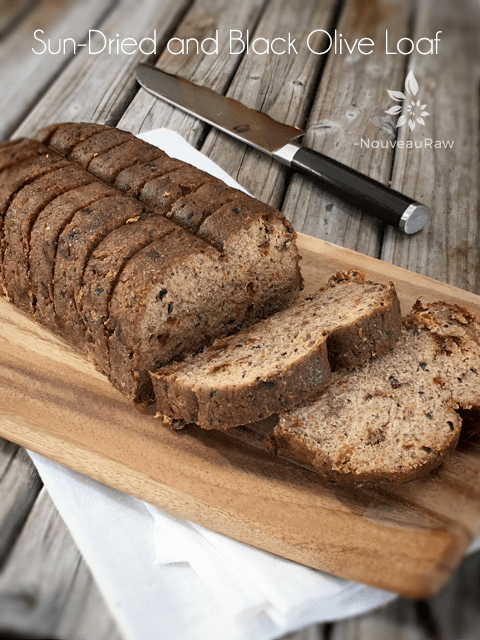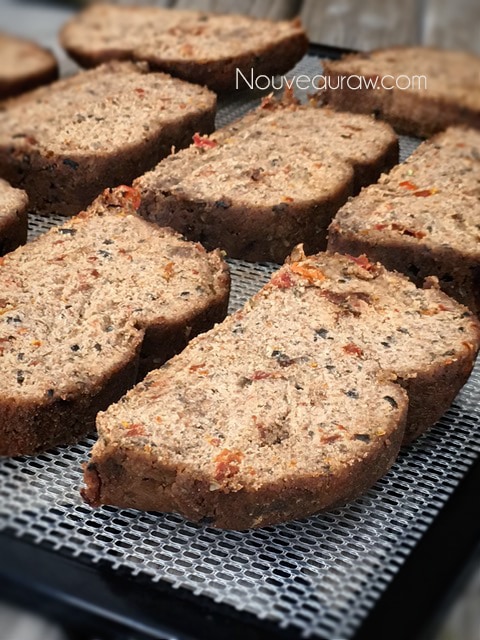Sun-Dried and Black Olive Loaf

 Add to favorites
Add to favorites

~ raw, vegan, gluten-free, Paleo ~
A savory, delicious bread that is stuffed with olives and sun-dried tomatoes makes this the perfect snack, appetizer, or a mouthwatering sandwich that will be loaded with a wonderful Mediterranean flavor.
I quickly fell in love with all the fantastic flavors found within this bread. The deep richness of the sun-dried tomatoes, coupled with the salty pockets of olives, came together with gentle hints of Italian seasonings and the earthiness of rosemary.
Looks Baked to Me!
It’s true, it does look baked, BUT it wasn’t, cross my apron strings! All those wonderful enzymes were preserved by dehydrating this bread at a low temperature. Aesthetically what makes this bread appear to have been cooked is the crust.
The key is to place the whole loaf into the dehydrator at 145 degrees (F) for that 1st hour. This technique doesn’t “cook” the bread. I have a link below explaining why and how this works. No photo imagery hokey pokey done here! :)
I feel that it is imperative that I quickly touch base on a few ingredients that I commonly use in raw bread and cake recipes. For those of you who know my raw bread recipes well, you can skip this next section, but it may also be a good refresher. :)
Almond pulp gives bread that fluffy texture.
Depending on how much of the milk you can squeeze from the nut bag, each batch of pulp will differ in moisture. Therefore, you may need to adjust the amount of liquids being used in recipes calling for nut pulp. If it has a really dry feeling, more moisture may need to be added. Or if the pulp is wet, less moisture would probably be necessary.
It is also best to make sure that the pulp is unflavored, and that is a step that has to be taken when first making almond milk. There is a link below that you can click on to learn more about this process if you are unfamiliar with it. BUT should your pulp already have small hints of sweetness to it, not to worry… I doubt it would be enough to affect the outcome of this recipe. I don’t recommend any substitutions for the almond pulp. It is the key ingredient that helped me to create a light and airy batter. But if you are feeling adventurous, please don’t let me stop you. :)
Well, let’s get this recipe moving along by me filling my mouth with a bite of this bread, so I stop talking. :) I hope you enjoy this recipe. I would love to hear what you think, so please leave a comment below. Blending blessings, amie sue
 Ingredients:
Ingredients:
yields large bread loaf
- 1/2 cup sun-dried tomatoes, soaked in 3/4 cup water
- 4 cups packed, moist almond pulp
- 1/4 cup minced black olives
- 2 Tbsp raw apple cider vinegar
- 2 Tbsp maple syrup
- 2 Tbsp Italian seasoning
- 2 tsp dried rosemary
- 1/2 -1 tsp Himalayan pink salt
- 2 tsp onion powder
- 2 Tbsp ground flax seeds
- 2 Tbsp psyllium powder
- 1/2 cup diced sun-dried tomatoes, stir in
Preparation:
- Soak the sun-dried tomatoes in 3/4 cup water for at least 15 minutes to soften them.
- Place the tomatoes and water in a small blender (Magic Bullet) and blend until it reaches a paste-like texture.
- In the food processor combine the almond pulp, tomato paste, black olives, vinegar, maple syrup, seasonings, flax, and psyllium powder. Process until well mixed.
- Depending on how moist your almond pulp is, you may need to add water, so the dough sticks together nicely. Add 1 Tbsp at a time until the right consistency is reached.
- Instead of maple syrup, you can use; raw agave, raw coconut nectar, or raw honey. The sweetness was added to balance out the flavors.
- To make Paleo, remove the sweetener.
- Add the other 1/2 cup of diced sun-dried tomatoes, pulse in, leaving bits of red throughout the batter.
- Remove the batter and shape into the desired loaf shape and size.
- Place the bread loaf on the mesh sheet that comes with the dehydrator and dehydrate at 145 degrees for 1 hour to create an outer crust.
- After 1 hour, remove from the dehydrator and cut the bread slices to the desired thickness. I did mine at about 1″.
- Return the slices to the mesh sheet laying the pieces flat.
- Decrease the temperature to 115 degrees (F) and continue to dehydrate for 4-6 hours.
- As an indicator, if it is dry enough, touch the center of the bread slices. You don’t want it to be doughy, but you also don’t want the bread to dry out too much.
- The dry time can be affected by the thickness of the bread, the humidity of the climate in which you live, and the make of the dehydrator.
- Shelf life and storage: Store the bread in an air-tight container, in the fridge, for 3-5 days.
- The more moisture that is left in your bread, the shorter the shelf life. Therefore, shelf life will vary with your drying technique.
- Whenever I make this bread, it never lasts very long enough to spoil.
- Keep in mind, the whole purpose of eating a raw diet is to eat foods at their peak of freshness.
- This bread also freezes very well. Wrap each piece in plastic wrap, then place in a freezer Zip-lock bag. If well protected, it should keep for up to 3 months.
The Institute of Culinary Ingredients™
- To learn more about maple syrup by clicking (here).
- What is Himalayan pink salt, and does it matter? Click (here) to read more about it.
- Learn how to grind your own flaxseeds for ultimate freshness and nutrition. Click (here).
- How does psyllium work in a recipe? Learn more (here).
Culinary Explanations:
- Why do I start the dehydrator at 145 degrees (F)? Click (here) to learn the reason behind this.
- When working with fresh ingredients, it is essential to taste test as you build a recipe. Learn why (here).
- Don’t own a dehydrator? Learn how to use your oven (here). I do, however honestly believe that it is a worthwhile investment. Click (here) to learn what I use.
© AmieSue.com
Tags: Almond Pulp, Dairy Free, Dehydrated, Gluten Free, Nut Free Option, Refined Sugar Free, Soy Free, sugar free, Vegan



 Add to favorites
Add to favorites
 ~ raw, vegan, gluten-free, Paleo ~
~ raw, vegan, gluten-free, Paleo ~ Ingredients:
Ingredients:
Psyllium seeds don’t go well with me. Amie sue do you think chia seeds would make a good substitute or have you tried anything else. Thanks
Good morning :) You can use ground chia or flax seeds. It won’t give the same sponginess that psyllium offers but it will still be good. Blessings, amie sue
Amie, how many cups of dry almonds need to make four cups of pulp? Thank you!! :)
Good evening Svetlana,
You caught me just in time.. I try to shut down electronics by 8pm :) This link will help you: https://nouveauraw.com/nut-veggie-juice-pulps/almond-pulp/.
Blessings and good night. :) amie sue